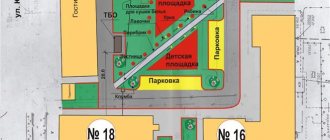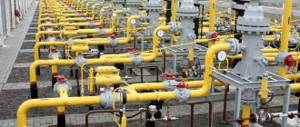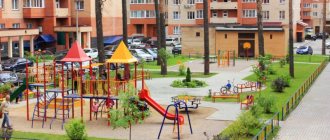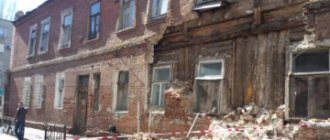According to the rules for carrying out activities for managing apartment buildings, approved by Decree of the Government of the Russian Federation No. 416 of May 15, 2013, the management of all residential buildings must be carried out on the basis of current standards. In 2014, in accordance with Federal Law No. 184 of December 27, 2002 “On Technical Regulation”, as well as in accordance with the orders of Rosstandart, national standards of the Russian Federation GOST R .
National standards were united under the general title “Housing and communal services and management of apartment buildings.” The documents were approved by Rosstandart Order No. 543 dated June 11, 2014 and came into force on July 1, 2015.
Requirements of national standards GOST R for activities related to management of apartment buildings
National standards GOST R have been developed to ensure closer and better interaction between the owners of premises in apartment buildings and management companies. The documents establish specific requirements for the qualifications of management specialists, the procedure for maintaining and updating technical documentation, forming a team, determining the cost and collecting payment for work performed and services provided for the maintenance and current repairs of common property in the house.
National standards and rules for carrying out activities for managing apartment buildings are established by the Government of the Russian Federation. In order to properly maintain the common property in the house, the management company must ensure sanitary and epidemiological measures, monitor the technical condition of the apartment building and monitor fire safety.
One of the main conditions of the national standards GOST R “Housing and communal services and management of apartment buildings” is the presence of a clearly formulated order for services (carrying out work on the maintenance and current repairs of common property in apartment buildings).
What is the operation of construction sites?
After completion of construction and commissioning of the facility, an equally important process of facility management begins. This is the operation of construction projects or, in other words, the safe operation of capital construction projects.
The operation of construction projects according to their functional purpose, first of all, should ensure comfortable and trouble-free living for people. Therefore, the safety of buildings and structures is always given great attention both at the stage of developing project documentation and during their subsequent operation.
Design standards were developed so that, on the one hand, the probable possibility of an emergency situation was excluded and the required margin of safety and durability of construction projects was ensured. But at the same time, the minimum cost of both design and construction itself was achieved without reducing consumer qualities.
Please note! Operation of construction projects is ensured by a range of property management services. Housing maintenance also includes technical inspections, scheduled and routine repairs, sanitary maintenance, etc.
Operation of industrial facilities
Main groups of construction sites for safety
The commissioning of construction projects is a very significant event for any construction company. The signed act of commissioning confirms the professionalism of the builders, the ability to fulfill their obligations and the desire to move forward in the creative process.
The consequence of all this is a high trust rating in the organization. This means new orders for buildings, houses, airports, and so on.
Depending on their purpose, all construction projects are divided into two large groups:
First group
Civil and industrial facilities, the safe operation of which does not fall under the jurisdiction of Rostechnadzor.
Second group
Hazardous production facilities, the safe operation of which is carried out only thanks to control by Rostechnadzor authorities.
Ready-to-use residential complex
The procedure for determining the scope of work and services for the maintenance of common property in apartment buildings
This procedure is contained in GOST R 56192–2014. But homeowners can also determine additional types of work/services at their own discretion if they consider their implementation to be effective.
A prerequisite for concluding a management agreement for apartment buildings is the correct establishment of the boundaries of responsibility. To do this, specialists from the management company must conduct technical inspections in accordance with GOST R 56194–2014. Technical inspections are carried out systematically and include the following types (clause 4.2):
- visual;
- instrumental;
- technical surveys;
- monitoring the technical condition of common property.
Technical inspections are carried out on the basis of technical specifications, with photo or video recording (clause 4.4). Based on the results, a report or act is prepared. Based on the inspections carried out, a plan and scope of work necessary to manage the apartment building is formed and offered to homeowners.
For complete mutual understanding between the owners of premises in MKD and management companies, it is necessary to use a single terminology. A unified terminology is prescribed when concluding a management agreement and is used to define the scope of work and services performed for the maintenance of common property in the house. To do this, owners need to decide at a general meeting to use terms and definitions based on national standards “Housing and communal services and management of apartment buildings,” including GOST R 51929–2014.
GOST R 56038–2014 “Management services for an apartment building” is one of the main national standards that will help formulate an order for services (carrying out work on the maintenance and ongoing repairs of common property in the building) for managing apartment buildings.
The management company must determine and offer homeowners the cost for each type of work/service when managing the house. In turn, the owners of premises in the house must approve the cost of work and services proposed by the management company in accordance with clause 5.5 of the standard.
Rules and regulations for technical operation of housing stock year 2021
In the Russian Federation in 2021, the rules and regulations for the technical operation of the housing stock, approved fourteen years ago, are in force. The drawn up rules allow you to determine all the points and details regarding the procedure for managing residential properties.
The initial document was developed by the State Committee for Construction and Housing and Communal Services (Resolution No. 170 “On approval of rules and standards for the technical operation of the housing stock” dated September 27, 2003) in order to explain how common property is managed, how apartments and houses are serviced, in what the work of public utilities is carried out in order. Today we will talk about what provisions are contained in this document and what you should pay special attention to when using it when organizing management activities.
All rules are a special annex to the above resolution. The main point that you should pay attention to when studying the document is that it contains information on what needs to be done to fully manage residential complexes.
So, the rules contain the following recommendations that must be followed first:
- establish rules for the operation of premises;
- carry out the necessary overhaul actions;
- the safety of common property and housing is ensured;
- regulate actions that are prescribed in the rules for housing maintenance;
- establish a procedure for conducting technical inventory.
This document is mandatory for execution by the local administration and government agencies monitoring the event at the federal and regional levels.
According to these standards, only certain objects belong to the housing stock. We are talking about the following buildings:
- Living spaces;
- hotel complexes;
- buildings from flexible stock;
- dormitories;
- housing for refugees;
- nursing home;
- official property;
- areas suitable for use.
All listed objects not only form certain groups, but are also subject to mandatory classification into private and public housing stock. It is worth highlighting the property of municipalities separately.
In addition to standard classifications and definitions, the document contains six sections related to redevelopment. These provisions set out the actions that must be taken in relation to residential premises.
The first chapter contains important points regarding the re-equipment and direct reconstruction of the premises, and in Art. 1.7.1 – 1.7.3 provide instructions on what measures may be considered acceptable when performing construction and installation work to improve the comfort of the home. According to the established rules, the following types of work are performed as part of the re-equipment:
- installation and dismantling of electric or gas stoves;
- transfer of gas-type heating units;
- replacement of plumbing equipment in the bathroom and toilet, including installation of showers, washing machines or other high-power appliances;
- laying and replacing pipelines and other communications.
The list does not end here, and detailed information can be gleaned directly from the rules.
As for redevelopment, slightly different measures are allowed here, and this issue is regulated by Article 1.7.2. The permitted works are:
- changing the configuration of the internal structure of rooms without deforming load-bearing walls;
- changing the location of the doorway;
- organizing an additional area in the kitchen;
- expansion of the living area in the apartment;
- changing the number of rooms by combining or dividing;
- improvement of vestibules and balconies.
The law warns that any actions related to reconstruction and carried out without permission may result in penalties for the apartment owner. The situation becomes special if the work performed has significantly worsened the living conditions in the premises.
The main points regarding the maintenance of housing stock are described in the first section of the document. Further, the articles of the rules spell out how the activities of organizations providing services are regulated. Important provisions are those that are responsible for the maintenance of communication nodes, the performance of repair work on premises and the nuances of maintaining the house itself. Several articles are devoted to how the work of dispatch and emergency services should be carried out.
Several points are devoted to the organization of work to prepare premises for the heating season and to organize sanitary maintenance of common property.
The listed provisions of the current rules are based on studies and observations. In addition, the document clearly indicates what actions should be taken to fully organize the maintenance of residential premises.
Knowledge and compliance with the rules and regulations for the technical operation of the housing stock is mandatory for officials. Compliance with the rules and regulations for the technical operation of the housing stock in 2021 includes:
- operation of houses;
- maintenance of buildings (multi-apartment);
- all types of repairs;
- carrying out reconstruction work of residential buildings;
- preservation of housing stock in the Russian Federation;
- maintaining houses in accordance with established standards, etc.
To understand and understand the State Decree. Committee of the Russian Federation for Construction and Housing and Communal Services dated September 27, 2003 No. 170 (Moscow), namely this normative and legal norm determines the rules and regulations for the technical operation of the housing stock in 2021, it is necessary to have not just a legal education, but also experience in the field housing legislation. Understand and distinguish between terms. Be able to apply them to the current situation. Know what types of housing stock are distinguished, their characteristics and differences. Know the conditions and standards of servicing not only apartment buildings, but also private and municipally owned buildings.
The consultant on duty of the portal “PravPotrebitel” will help you understand the points of the above document that are incomprehensible to ordinary people completely free of charge.
Customer service is provided by specialists online.
Like any other regulatory legal act, the resolution of the State Construction Committee has its own structure:
- the first part always talks about the general provisions of the document;
- the second part, marked with the Roman numeral 2, is a chapter that talks about how maintenance of housing facilities is organized and carried out: rules for conducting technical inspection;
- maintenance procedure;
- procedure for organizing routine repairs;
- procedure for organizing planned repairs;
- technical order maintenance of houses for which major repairs are planned;
- organization of work aimed at preparing housing facilities for seasonal changes;
- about stairwells;
- basement foundations and walls;
This is interesting: Improvement of courtyard areas of apartment buildings 2021
- the fifth part of the resolution is devoted to the repair and maintenance of engineering systems: heat supply;
- heating;
- water supply;
- decentralized heat supply;
- gas supply;
- equipment to ensure the operation of televisions, radios, etc.;
- water supply and sewerage disposal;
- elevator;
- garbage chute;
- basics;
You can get acquainted with this regulatory legal act in more detail by downloading it on our website. The link was provided above in the text.
Or you can simply consult with the portal “PravPotrebitel” and not waste time studying this document or other documents regulating legal relations in the housing sector.
The answer will be given completely free of charge and on the topic that is most relevant to you at the moment.
According to the same resolution of the construction committee, the exploitation of the housing stock can occur as a result of various actions:
- facilities management;
- maintaining engineering systems and structures of the housing facility in working condition;
- compliance with the instructions of sanitary control authorities.
The first item from the above list defines:
- organizational actions;
- establishing and maintaining relationships with third party organizations/suppliers;
- any relationships and connections with those who rent part of the internal territory of the building from the owners.
The second item from the above list determines the order in which certain types of work are performed:
- ongoing repair work;
- major repair work;
- inter-seasonal preparation of housing facilities;
- periodic inspections of all major components to timely determine the need for repairs.
The third item from the above list determines the order:
- cleaning rooms identified to meet the needs of all residents;
- maintaining cleanliness of the surrounding land;
- everyday life of plants, flowers, trees.
The rules and regulations for the technical operation of the housing stock are not the only legislative act regulating this area of life. Legislation in this niche is much more diverse. Therefore, it is easier to contact lawyers with a specific question than to study a bunch of laws.
The concept of housing stock is defined by the totality of all houses and buildings with residential status on the territory of our country in 2021. In this case, the type of ownership and purpose of the residential property does not matter. In any case, the building is included in the housing stock if it is recognized as suitable for living in the prescribed manner with changes in regulations for 2021. Including:
- dormitories;
- categories of accommodation provided to displaced persons;
- hotel buildings;
- correctional schools and orphanages for children and/or disabled people;
- apartments for employees;
- any other objects that are listed as residential premises.
Housing categories:
- private: categories of houses and buildings whose owners are recognized by law as individuals (construction, privatization, purchase, donation, etc.);
- buildings acquired through membership in cooperatives (subject to full payment of share payments);
- acquisition of buildings and houses for private ownership on other legal grounds;
- categories of houses and buildings owned by legal entities on various legal grounds;
The first part of the resolution, which approves the rules and regulations for the technical operation of the housing stock, also defines the responsibilities of individuals. and legal persons in relation to the maintenance of houses (also apartments). As well as requirements for the procedure for maintaining and storing technical documentation.
To maintain any home in good condition, you need to take care of it. Contractors who are engaged in similar activities are hired for repair work. Repairs can be planned or unscheduled. When carrying out planned actions at a site, a schedule is drawn up in advance. Unplanned work should be carried out as the need arises. The list of works that relate to current or major repairs is approved by the resolution of the State Construction Committee under consideration. Users of the “PravPotrebitel” portal can download it for free (see above).
The maintenance period for residential buildings in terms of routine repairs is between three and five years. The time between previous and subsequent repairs is determined:
- capital group of houses;
- natural conditions;
- degree of wear.
Repair of engineering systems is carried out by specialists from companies involved in their maintenance. For example, representatives of housing and communal services will repair sewer systems. If the building is planned to be demolished within the next five years, routine repairs are carried out only at the stage of preventing emergency situations. The results of the work must be accepted by the commission consisting of the following:
- representatives of the company that carried out the repair work;
- representatives of the apartment owners of this building.
Major repairs are carried out only at pre-planned dates. If a building is to be demolished in the next decade, major renovations are carried out only to maintain sanitary control installations. And to ensure the safety of residents.
This document was adopted by a decree of the State Construction Committee of the Russian Federation in 2003, and continues to be in force in 2021.
The rules for the operation of housing stock include provisions governing all issues related to the use of these objects.
The rules and regulations for the technical operation of the housing stock 2021 contain provisions that regulate the use of residential facilities, as well as their repair and reconstruction.
The document includes a number of sections, including those devoted to:
This is interesting: Can a property owner evict a person without his consent 2021
A number of annexes have also been adopted to the document, including:
- establishing the frequency of inspections of objects;
- maximum time for troubleshooting through unscheduled repairs;
- form for filling out a log with the results of building inspections;
- list of works performed for the purpose of maintaining objects, etc.
The rules and regulations of technical operation indicate that the housing stock means all residential premises. Their inclusion in this category is not affected by the form of ownership that applies to them.
Such a fund includes directly residential buildings and apartments, as well as; specialized, including:
- shelter hotels;
- dormitories;
- objects of maneuverable fund;
- premises intended for refugees and forced settlers for the purpose of temporary accommodation;
- houses designed for single elderly people;
- boarding schools for people with disabilities and veterans;
- service premises.
The list is not closed; the last item on it shows other premises in other buildings that can be used for living.
The housing stock is also divided into:
- individual-type residential buildings;
- apartments and houses:
- privatized;
- purchased with your own funds.
Built in-house:
- objects located in buildings erected by housing construction cooperatives (HBCs), the share payment for which has been repaid in full;
- in houses belonging to partnerships uniting the owners of residential premises located in them;
- apartments and houses received by owners on other grounds;
- areas owned by legal entities; which were purchased or erected at their expense;
- including those related to housing cooperatives
Areas that are owned by the subjects of the Federation, and directly by the same organizations as in the previous paragraph, but managed by authorities at the regional level;
The Fund of Municipalities, considered as a separate item, since these bodies are not included in the state system, including:
- areas managed by local authorities operating in certain districts, cities, entities, which are included in them as separate units, in particular in St. Petersburg and Moscow, which are formally subjects of the Federation, the administration disposes of the housing stock precisely as municipal;
- objects classified as enterprises carrying out economic management in relation to them and institutions under operational management
The document contains a section concerning the refurbishment (including redevelopment and reconstruction) of both residential and non-residential premises and improving the level of improvement of houses and other facilities.
It is indicated that these procedures are permitted to be carried out only after permission has been obtained for them in the prescribed manner.
It is stipulated that it is not allowed to redevelop the premises, which leads to the following results:
- destruction of the supporting structures of the building or deterioration of its strength;
- interference in the functioning of engineering systems, including the devices included in them;
- degradation of the surface of the building facade or reduction in its safety;
- harm to the operation of fire-fighting devices.
It is not allowed to carry out such actions if, as a result of this operation, the living conditions of all the inhabitants of the house or some of them, including those living in a separate room, become worse.
If the tenant has made unacceptable changes to the residential premises, then he must return it to its previous condition.
In particular, such a requirement is provided for when unauthorized:
- reconstruction of premises with both residential and utility purposes;
- refurbishment of a loggia or balcony;
- installation or updating of previously installed equipment, including plumbing and other types.
Rules and regulations for technical operation include the following acceptable types of work:
Redevelopment of premises includes:
- creating doorways where there were none;
- partitions and their transfer;
- changing the configuration of rooms in the apartment, including combining several into one and disaggregating them;
- increasing the residential area by converting it into auxiliary premises;
- equipment of bathrooms and kitchens;
- elimination of entrances to kitchens through residential premises or apartments, as well as these premises themselves without windows;
- refurbishment of vestibules or their creation.
It has been established that the consequences of any work recognized as unacceptable must be eliminated by the owner of the premises who performed it at his own expense.
The rules and regulations state that the premises must be kept clean. They also need to maintain humidity and temperature at the proper level; in addition, air exchange rates must be observed.
In apartments, it is necessary to avoid the formation of condensation on sewer and water pipes.
This is achieved by regularly ventilating the spaces, keeping the ventilation openings completely open. If these actions are not enough, then it is necessary to waterproof and insulate the pipelines.
In order to improve air exchange rates in rooms, it is necessary to use local air supply devices, including window sills, as well as channels in the walls and in the installation of furnaces. It is recommended to install fans in exhaust openings.
To maintain proper humidity and temperature conditions in external walls, it is not advisable to place furniture of significant size and weight directly next to them; this rule should be observed to the greatest extent in relation to the corners.
Also, during the first two years of residence, it is not recommended to place paintings and carpets on such walls. Electric and gas stoves are not used to maintain the proper temperature in the apartment.
In addition, standards have been established regarding the operation of staircases. The service organization is obliged to maintain all devices located on this territory in good working order.
It is necessary to maintain the proper sanitary condition of these areas and the temperature and air exchange parameters within normal limits. Walls in staircases should be painted with high-quality, water-free compounds.
Thus, the described rules and regulations contain a section that establishes the categories of premises in question.
It also determines what types of refurbishment and redevelopment are allowed inside the home. In addition, the document includes provisions on the procedure for operating the premises.
- Due to frequent changes in legislation, information sometimes becomes outdated faster than we can update it on the website.
- All cases are very individual and depend on many factors. Basic information does not guarantee a solution to your specific problems.
That's why FREE expert consultants work for you around the clock!
APPLICATIONS AND CALLS ARE ACCEPTED 24/7 and 7 days a week.
This is interesting: Electricity tariffs for enterprises: description of tariffs 2021
The work of the management organization is determined by a number of special regulations. One of them is the rules and regulations for the technical operation of the housing stock established by the State Construction Committee. The article is devoted to how the Criminal Code applies the provisions of this document in practice. It is separately noted what to pay special attention to when applying the rules in organizing management activities. The last point discusses changes to existing regulations that affect the work of management companies.
In 2021, the rules and regulations for the technical operation of the housing stock, adopted 15 years ago, continue to apply in our country. The document establishing them is Gosstroy Resolution No. 170 of October 27, 2003. Its developers wanted to explain:
- how to manage common property;
- how to maintain apartment buildings and apartments;
- What rules do public utilities operate under?
The scope of the rules and regulations for the technical operation of the housing stock from Resolution 170 is defined in their title. They apply to all buildings and objects that are recognized as housing. In addition to multi-apartment and private residential buildings, this includes:
- dormitories;
- hotels;
- orphanages and institutions for permanent residence of persons with various diseases;
- service apartments;
- housing for displaced people;
- other premises with residential status.
The operating rules apply to all categories of housing stock:
- private, its owners are individuals and organizations;
- state;
- municipal;
- public (if the object belongs to a public organization).
The first part of the rules is devoted to the obligations of citizens and organizations when servicing residential buildings, including apartment buildings. It also talks about the need to maintain and store technical documentation. Officials are required to know the rules in question and strictly follow them. In 2021, the rules and regulations for the technical operation of the housing stock from Gosstroy Order No. 170 regulate how:
- residential properties are operated;
- apartment buildings are serviced;
- all types of repairs are carried out;
- houses are being reconstructed;
- the country's housing stock is preserved;
- houses are maintained in compliance with established standards, etc.
The purpose of creating rules for the operation of housing stock is to provide citizens with normal living conditions. It is necessary to manage common property and provide utilities with an emphasis on the comfort and safety of residents.
The next important point is reducing costs and extending the service life of residential buildings. The main expenses of management organizations are agreed upon with the apartment owners. The responsibilities of the management company include regular inspection of the condition of buildings, their maintenance and repair. Many procedures are seasonal due to our climate.
The task of the service organization is to slow down the physical wear of the MKD elements and extend its service life. For this purpose, preventive and repair work is carried out.
The rules contain priority recommendations for management organizations:
- determine the operating conditions of the premises;
- ensure the safety of housing stock and common property;
- carry out the necessary overhaul measures;
- determine the procedure for technical inventory;
- track the implementation of other actions from the rules and regulations of housing operation.
Home maintenance is a continuous process. The management organization draws up plans for its implementation for at least a year. An important stage of maintenance is the change of seasons. Special measures are carried out in preparation for the heating season and at its end.
Depending on the capabilities of the management company, maintenance of the housing stock is carried out:
- on your own;
- with the involvement of specialized organizations;
- with the participation of tenants and landlords (if there are such premises in the building).
The rules and regulations for the technical operation of the housing stock determine three areas of technical maintenance.
1. Direct maintenance and maintenance of housing. This includes emergency and dispatch services. Its task is to maintain the proper condition of building elements and in-house engineering systems.
2. Regular inspections. When carried out, many deficiencies are prevented or detected at an early stage. During the inspection, the specialist will determine how to eliminate (prevent) the defect and supervise the necessary work.
3. Seasonal preparation. It is carried out before the start of the winter period and after its completion.
In winter, the architectural elements of the apartment building and its communications experience additional stress. To reduce their negative impact, special training is carried out. Let us list the main procedures included in it.
1. Defects in load-bearing structures, roofs, facades, and ceilings are eliminated. The basement, window and door openings are inspected for deficiencies. The heating, water, electricity and gas supply systems, sewage drainage and chimney systems are checked. If necessary, communications are restored.
2. The local area is in order. Its elements are prepared for snowfalls and wastewater disposal.
3. Waterproofing of the foundation, basement walls, basements and attics is carried out. Flights of stairs and elevator cabins are inspected. The fire hydrant is checked for serviceability.
4. Current repairs are being carried out, which cannot be postponed during the cold period. For example, this includes “wet” construction work outdoors and in unheated rooms.
The rules and regulations for the technical operation of the housing stock from Resolution No. 170 contain provisions important for the work of the management company. However, they are advisory in nature, which regularly becomes the cause of disputes between management organizations and the State Housing Inspectorate. GZHI requires compliance with the provisions of these rules. According to Federal Law No. 294 of December 26, 2008, the administrative authority has the right to challenge fines and orders based on such documents.
GZHI insists on compliance with the rules and regulations for the technical operation of the housing stock (download their full text in the attachment) because other governing documents lack specifics about the types of work. For example, it is not enough in the rules from the RF PP No. 491 of August 13, 2006. They contain a list of works for the maintenance and repair of common property. The types, frequency and seasonality of work are most fully disclosed in Resolution No. 170.
In 2021, conversations continued about the abolition of rules and regulations for the operation of housing stock. However, the document remains valid and useful in the work of management organizations.
»
Other
Replacing risers in an apartment building: who should replace them and at whose expense in 2021
Read more
Other
Hot water flows from a cold tap - reasons for 2021
Read more
Great article 0
Technical documentation
One of the main requirements of the national standard GOST R 51617–2014 “Utilities” is the availability of technical documentation, including operating instructions for household equipment. The technical documentation indicates the technical parameters of utility resources at the point of their delivery to the MKD from the RSO.
Owners of premises in apartment buildings often wonder on the basis of which regulatory documents the management company determines the scope of work/services and their cost. The procedure for determining the scope of work/services is specified in GOST R 56194–2014. The procedure for determining the cost of work/services is specified in GOST R 56038–2014.
Major renovation
Major repairs are carried out by a technical customer, which may be a regional operator, a homeowners' association or a management company. When choosing a method for opening an account at OSS to form a capital repair fund, the owners’ decision must indicate that major repairs should be carried out in accordance with GOST R 56193–2014.
If the overhaul fund is formed on the account of a regional operator , then it is this operator who is responsible for organizing and carrying out overhauls. When choosing a special MKD account, the entire procedure for organizing and carrying out major repairs falls on the shoulders of the owners of the premises in the house.
Read more about major repairs and opening a special account in the articles:
- Lost in translation: The nuances of a major overhaul
- Creation of a special capital repair account for apartment buildings
Transition to management of apartment buildings in accordance with standards
In accordance with Article 1 and 12 of Federal Law No. 184 of December 27, 2002 “On Technical Regulation”, standardization of the activities of management companies for managing apartment buildings is based on the voluntary application of regulatory documents.
To switch to MKD control according to GOST R, you need to fulfill 3 conditions:
- At a general meeting of premises owners, it is necessary to make a decision on the voluntary transfer of management of the apartment building and the implementation of work on the maintenance and routine repairs of common property in the house on the basis of national GOST R standards. Indicate in the decision of the home owners all selected national standards, approved requirements and the procedure for performing the work.
- QM specialists should study national standards in order to apply them in practice.
- The management company needs to implement management, personnel training, assessment and quality control systems. The management company will have to implement a system of assessment and quality control and at least once every 5 years in order for specialists to undergo advanced training (clause 9 of GOST R 56192–2014).
However, it should be taken into account that the standardization of the activities of a management company for the management of apartment buildings should not contradict compliance with licensing requirements, which is the fundamental principle of its work.
Housing and communal services in Russia
Technical maintenance of buildings is a whole range of services for property management, operation and maintenance of the infrastructure of residential and non-residential real estate. Maintenance of the housing stock also includes technical inspections, scheduled preventative and routine repairs, and sanitary maintenance.
The main goal of the technical operation of real estate is to achieve the most efficient use of the housing stock with the most appropriate use of real estate.
What is what? (Management and maintenance. What's the difference?)
The state puts forward certain requirements for the condition of multi-apartment residential buildings. Such requirements are regulated by the relevant legislation of the Russian Federation. In order for everyone to speak the same and understandable language when it comes to an apartment building, it is necessary to understand the terminology.
Technical maintenance of buildings includes:
Apartment building management
- organization of operation of the common property of the house;
- relationships with service organizations and service providers;
- work with owners and tenants of premises in an apartment building.
Maintenance of an apartment building
The management of the house is carried out on the basis of a management agreement between the owners of the premises and the management organization.
Building maintenance is work and services to maintain the building and internal systems in good condition, using the required amount of material and financial resources.
Maintenance includes:
- maintenance of common property;
- current repairs of common property.
Maintenance of common property - services aimed at providing owners and tenants of premises with the opportunity to use an apartment building in compliance with their rights, obligations and legitimate interests.
The maintenance of common property includes:
- regular inspections of common property;
- lighting of common areas;
- maintaining the required temperature and humidity in common areas;
- cleaning and sanitary cleaning of common areas
- collection and removal of solid household waste;
- fire safety measures;
- maintenance of landscaping and landscaping elements;
- preparation for seasonal operation;
- dispatch and emergency services
Current repairs of common property - work to eliminate malfunctions of individual parts and elements of multi-apartment residential buildings.
The provision of services and performance of work on maintenance and repair of the common property of the house is carried out by third-party organizations on the basis of an agreement with the management organization.






